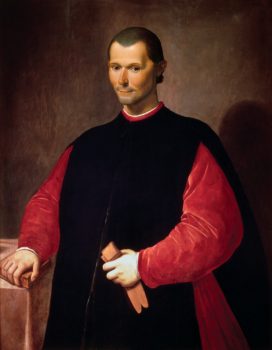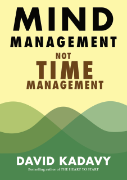Subscribe to blog updates via email »
Summary: The Prince by Niccolò Machiavelli – Love Your Work, Episode 295
 The Prince is a political treatise, written by Niccolò Machiavelli, first distributed in 1513. It’s infamous for its apparent advice to political leaders to lie, murder, and manipulate. It’s still a fascinating read today, and is thought-provoking when considering any context where the true motives of actions may not be what they seem. Here, in my own words, is a summary of Niccoló Machiavelli’s, The Prince.
The Prince is a political treatise, written by Niccolò Machiavelli, first distributed in 1513. It’s infamous for its apparent advice to political leaders to lie, murder, and manipulate. It’s still a fascinating read today, and is thought-provoking when considering any context where the true motives of actions may not be what they seem. Here, in my own words, is a summary of Niccoló Machiavelli’s, The Prince.
Listen to the Podcast

WANT TO WRITE A BOOK?
Download your FREE copy of How to Write a Book »
(for a limited time)
- Listen in iTunes >>
- Download as an MP3 by right-clicking here and choosing “save as.”
- RSS feed for Love Your Work
Is The Prince advice, satire, or sabotage?
Machiavelli wrote The Prince while in exile from Florence. Since he opens it with a letter to Lorenzo d’Medici it seems like Machiavelli was trying to get a political position with the Medici, by demonstrating his political knowledge. (The Medici had recently returned to power in Florence, after themselves being exiled fifteen years.) But, some scholars think The Prince is satire. Others think the advice within was a ploy, in that if it were followed, the actions would weaken the power of the Medici.
“The ends [justified] the means,” in Renaissance Italy
Though the phrase isn’t in the book, The Prince is the origin of the saying, “the ends justify the means.” In other words, if you have an important goal, morality doesn’t matter. It’s also the inspiration for the name of the personality trait of “Machiavellianism”, which is characterized by manipulativeness, insensitivity, and an indifference to morality. Psychologists include Machiavellianism in the “dark triad” personality traits, along with narcissism and psychopathy.
Sixteenth century Italy was the perfect environment for advice like that in The Prince to flourish. There was constant conflict amongst small governing bodies, including the most-notable city-states of Florence, Milan, Rome, Naples, and Venice. Additionally, there were frequent invasions by Spain, France, or the Holy Roman Empire. If the numerous examples Machiavelli cites in The Prince are any indication, if you didn’t lie, murder, and manipulate, you wouldn’t stay in power, and probably would be murdered yourself.
You don’t have to be Machiavellian to learn from The Prince
As you listen to this advice, it’s not hard to think of similar, less-violent situations in our everyday lives, as we build relationships and careers, or watch others vie for power. So what is some of this juicy advice that has made The Prince and Niccolò Machiavelli so infamous?
I’ll break down this summary into two sections, followed by some historical examples Machiavelli cites, peppered with some quotes. Those two sections are:
- Gaining power
- Retaining power
(Note this isn’t how Machiavelli organizes The Prince.)
1. Gaining power
First how to gain power. Machiavelli points out that the people within a state are eager to change rulers. People naturally expect change to improve their lives, so, they’re willing to join in armed resistance against the ruling power.
This attitude extends from the people, to other states. If a powerful foreigner invades a country, the states within want to help overturn the rule of the most-powerful state.
But you have to be careful. It’s normal to want to acquire more land, but when you try to do it by any means possible, you end up making dumb mistakes.
How this applies to other domains
As you hear this, you may already have some parallels to other domains bouncing around in your head. How many times have you bought a product just slightly different from one you already had, because you believed the change would make your life better?
Marketers take advantage of this. I’ve read one marketing book that advised to think of the product you’re marketing as a “new opportunity.” Changing leadership is a “new opportunity,” that temporarily makes you optimistic, like how we feel when a New Year comes around. But often, the new product, the new ruler, or the New Year doesn’t make your life better. We get stuck in a cycle of wanting change and striving for it, only to find we aren’t better off than before, which drives our desire to change once again.
This is why, to quote Machiavelli:
There is nothing more difficult to take in hand, more perilous to conduct, or more uncertain in its success, than to take the lead in the introduction of a new order of things. Because the innovator has for enemies all those who have done well under the old conditions, and lukewarm defenders in those who may do well under the new. —Niccolò Machiavelli The Prince
In other words, you might get short-term support in the change you’re trying to introduce, but the support you once had will soon wane, and those who were doing well before will try to overthrow you.
2. Retaining power
This brings us to the second section, about retaining power. Being able to retain power starts with choosing carefully where and how you gain power. This is why Machiavelli warns:
He who has not first laid his foundations may be able with great ability to lay them afterwards, but they will be laid with trouble to the architect and danger to the building. —Niccolò Machiavelli The Prince
Any new state is extremely fragile, unless the person who unexpectedly gained power over that state is highly-skilled. You can gain power by getting the help of the people, or other states, but whoever helped you will probably be disappointed in what they get from it, and will no longer want to help you.
Be especially careful not to make your allies much more powerful, because then they’ll become threats. Additionally, they’ll distrust you, because in the process of helping them, they saw how cunning you are.
So, if you’re invading a place, you want to be on the good side of the natives. However, if they’re used to being free, you’ll have to destroy them, or they’ll destroy you. As Machiavelli said:
Men ought to either be well treated or crushed, because they can avenge themselves of lighter injuries, of more serious ones they cannot. —Niccolò Machiavelli The Prince
In other words, if they’re dead, they can’t get revenge. And:
He who becomes master of a city accustomed to freedom and does not destroy it, may expect to be destroyed by it. —Niccolò Machiavelli The Prince
If you want to retain power in a new state, you need to start a colony there. You don’t have to spend a lot on the colony, because after you take the land and houses of people, they will be, “poor and scattered,” and can’t hurt you. It’s important to be in the place you’re ruling, because otherwise you don’t find out about things that go wrong until it’s too late to fix them.
Statecraft is a lot of work, because, as Machiavelli says:
He who has relied least on fortune is established the strongest. —Niccolò Machiavelli The Prince
How this applies to other domains
Some of this advice may resonate with situations you’ve experienced. Some of it may be horrifying to you. Here’s how it can apply to other domains.
Imagine you’re a CEO, and you’ve just acquired a new company. It’s best to get it right the first time. If you make mistakes, you’ll have a hard time leading the company.
When a company acquires another, or a new leader comes into a company, you often see layoffs right away. This mirrors Machiavelli’s related advice, which is:
Injuries ought to be done all at one time, so that, being tasted less, they offend less; benefits ought to be given little by little, so that the flavor of them may last longer. —Niccolò Machiavelli The Prince
If done according to Machiavelli’s advice, after the brutal layoffs, there will be ice-cream socials, team-building exercises, and bonuses scattered over the coming months and years, hopefully without more massive layoffs. Whoever is in charge had better have close oversight to an office that’s far away from headquarters, otherwise by the time you find out about problems, it’s too late to fix them.
How not to rule: King Louis XII
A leader who Machiavelli uses as a warning for not ruling well is King Louis the XII, of France. The Venetians brought in King Louis, because they wanted to seize half the state of Lombardy. But they later realized, they had helped make Louis king of two-thirds of Italy.
Louis was now well-positioned, but then his mistakes began. He helped Pope Alexander occupy the Romagna, divided the kingdom of Naples with the king of Spain, and turned around and tried to conquer Venice’s territories.
So, he weakened the minor power of Venice, losing their alliance, made a great power – the pope – even more powerful, and brought in a foreign power – Spain. He didn’t settle in the land he had conquered, and didn’t set up colonies.
How to rule: Cesare Borgia
Like Louis XII when the Venetians enlisted his help, Cesare Borgia came into power through fortune. Unlike Louis, he made what Machiavelli felt were wise decisions.
Cesare was the son of Pope Alexander VI, who himself was cunning. He wanted to give Cesare a state to rule, but there weren’t good options. For example, the Milanese or the Venetians would stop him, and anyone in Italy who might have helped knew better than to make the pope even more powerful.
When the Venetians brought the French into Italy, Alexander didn’t make a fuss, and even helped Louis out by dissolving his marriage. He provided some soldiers to help out in a military campaign in Romagna, and now his son, Cesare was the duke of Romagna.
But Cesare wasn’t thrilled with his military. The Orsini soldiers didn’t seem psyched to take Bologna, and when he attacked Tuscany after taking over Urbino, Louis made him stop. So Cesare decided to figure out how to do things on his own.
Cesare Borgia followed Machiavelli’s advice (somewhat literally)
Anywhere Cesare took power, he was sure to kill the nobles and their families. He weakened the Orsini and Colonna parties in Rome, by making them nobles and giving them a good salary. Then he brought in a Spaniard named Ramiro d’Orco (also known as Ramiro de Lorca) to govern the Romagna. The Romagna had been in disorder when Cesare took over, and d’Orco restored order, but through nasty means, using lots of torture, public executions, and fines.
Once d’Orco had cleaned things up, Cesare – according to Machiavelli – didn’t want to be associated with d’Orco’s reign of terror. So, he had him publicly executed, and put his head on a stick in the town square.
Machiavelli was an advisor to Cesare during this time, and felt that Cesare did almost everything right to make the best of the power he had gained through fortune, and lay a foundation that could withstand the inevitable death of his father, the pope. Machiavelli says:
He told me that he had thought of everything that might occur at the death of his father, and had provided a remedy for all, except that he had never anticipated that, when the death did happen, he himself would be on the point to die. —Niccolò Machiavelli, The Prince (on Cesare Borgia)
When the pope did die – sooner than expected – Cesare himself was nearly dead from malaria. Though he won the favor of the next pope, Pius III died after only twenty-six days. Machiavelli felt Cesare’s one mistake was then helping elect Pope Julius II, who had promised him favors in return. As Machiavelli says:
He who believes that new benefits will cause great personages to forget old injuries is deceived. —Niccolò Machiavelli, The Prince
Cesare had slighted Julius in the past, and he wasn’t going to forget that. Julius seized land from Cesare, and didn’t support him.
You can see a dramatization of the story of Pope Alexander and Cesare Borgia in Showtime’s excellent-but-incomplete series, The Borgias.
The Prince, today
Machiavelli’s advice – if it really is that – sounds brutal to modern ears, but it was a product of the reality of the time. Machiavelli was the only one brave enough – maybe desperate enough – to describe that reality.
In many areas of life, business, and politics, the true effects of actions are often more complex than they appear on the surface. Sometimes this is an accident, many times it’s deliberate. Why does a politician, a CEO, or a even a friend say what they say?
I’m almost tempted to list The Prince on my best media books list, because the effect of a piece of media is always deeper than it appears on the surface. Political leaders in sixteenth-century Italy influenced perceptions through public events that could be described as media. You could say Cesare Borgia’s public execution of Ramiro d’Orco was a pseudo-event. If so, Ryan Holiday’s Trust Me, I’m Lying is like a modern day, The Prince: exposing the fundamentally-ugly reality of how a complex and brutal system that affects public perceptions works.
Why Machiavelli’s exile wasn’t lonely
Lest you have a low opinion of Niccolò Machiavelli from the content in The Prince, I want to leave you with something more endearing about him. When the Medici returned to power, they suspected Machiavelli of conspiring against them, so had him jailed and tortured – a decent reason to believe The Prince may have been satirical or, fittingly, a Machiavellian gambit to cause the Medici harm.
Exiled to his farm estate, and stripped of his position as a political advisor, Machiavelli did his best to keep doing the work he loved, and retain a sense of dignity. In a letter to a friend, he described his daily ritual:
When evening comes, I go back home, and go to my study. On the threshold, I take off my work clothes, covered in mud and filth, and I put on the clothes an ambassador would wear. Decently dressed, I enter the ancient courts of rulers who have long since died. There, I am warmly welcomed, and I feed on the only food I find nourishing and was born to savor. I am not ashamed to talk to them and ask them to explain their actions and they, out of kindness, answer me. Four hours go by without my feeling any anxiety. I forget every worry. I am no longer afraid of poverty or frightened of death. I live entirely through them. —Niccolò Machiavelli, Letter to Francesco Vettori
There’s your summary of Niccolò Machiavelli’s The Prince
If you enjoyed this summary, I highly recommend you read Niccolò Machiavelli’s The Prince. There’s also an excellent free online annotated version online, called The Annotated Prince.
Thank you for having me on your podcasts!
Thank you for having me on your podcasts. Thank you to David DeCelle for having me on The Model FA podcast.
As always, you can find interviews of me on my interviews page.
Join the Patreon for (new) bonus content!
I've been adding lots of new content to Patreon. Join the Patreon »
Subscribe to Love Your Work
Listen to the Podcast
- Listen in iTunes >>
- Download as an MP3 by right-clicking here and choosing “save as.”
- RSS feed for Love Your Work
Theme music: Dorena “At Sea”, from the album About Everything And More. By Arrangement with Deep Elm Records. Listen on Spotify »


